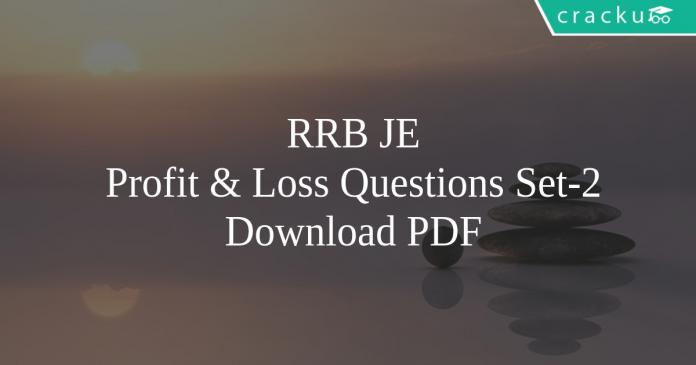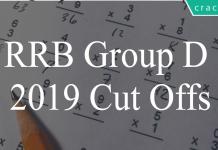RRB JE Profit & Loss Questions Set-2 PDF
Download Top 15 RRB JE Profit & Loss Questions Set-2 and Answers PDF. RRB JE Maths questions based on asked questions in previous exam papers very important for the Railway JE exam.
Download RRB JE Profit & Loss Questions Set-2 PDF
Download RRB JE Previous Papers PDF
Question 1: If an article is sold at Rs. 304.5, the shopkeeper incurs a loss of 13%. What should be his selling price to gain a profit of 13%?
a) Rs. 395.5
b) Rs. 387.5
c) Rs. 399
d) Rs. 391.5
e) Rs. 401
Question 2: Ram buys toys at 8 pieces per 70 rupees. He sells toys in boxes containing 5 toys. At what price must he sell a box if he wants to realize a profit percentage of 60%?
a) Rs. 50
b) Rs. 60
c) Rs. 70
d) Rs. 80
e) Rs. 90
Question 3: A salesman makes a profit of 30% when he gives a discount of 35% on the marked price. What will be the profit if the discount given is 20%?
a) 45%
b) 50%
c) 63%
d) 55%
e) 60%
18000+ Questions – Free SSC Study Material
Question 4: A dishonest shopkeeper marks up the price of the goods by 50 % and then offers a discount of 20 %. He uses a faulty weighing machine which shows 1000 g when the actual weight is 800 g. What is his profit percentage in the sales?
a) 25 %
b) 20 %
c) 50 %
d) 32 %
e) 40 %
Question 5: An article when sold for 960 fetches 20% profit.What would be the percent profit /loss if such 5 article are sold for Rs. 825/-each?
a) 3.125 % profit
b) 3.125 % loss
c) Neither profit nor loss
d) 16.5 % profit
e) None of these
Question 6: Mahesh bought 10 pencils for 80 rupees and he sold them at 9.2 rupees per each pencil. What is the profit /loss percentage?
a) 17%
b) 25%
c) 20%
d) 15%
RRB JE Free Mock Test (latest pattern)
Question 7: The cost price of an article is Rs.1700. If it was sold at a price of Rs.2006, what was the percentage profit on the transaction?
a) 18
b) 12
c) 10
d) 15
e) 20
Question 8: Manoj incurred a loss of 40 percent on selling an article for 5,700. What was the cost price of the article ?
a) 7,725
b) 9,080
c) 8,250
d) 9,400
e) None of these
Question 9: A whole-seller sells apples to a fruit vendor at cost price. The vendor manages to trick the whole-seller into giving him an extra apple per four apples that he buys. But, the whole-seller on sensing some foul play decides to change the weighing machine, citing some fault in it, for measuring the remaining two-thirds of the lot. The new weighing machine is such that it shows the weight of 3 apples equivalent to 5 apples. How much does the whole-seller originally gain/lose in the entire transaction? (Assume all apples to be of uniform size and weight)
a) Loss of 18.33%
b) Gain of 18.33%
c) Loss of 37.78%
d) Gain of 37.78%
Question 10: A shopkeeper, after being insisted by a customer, gives a discount of 33.33%. He later realizes that he made a loss of Rs 10. He calculates that he should have a given a discount of only 20% to get the profit of Rs 10. By what % does the shopkeeper mark up the price of the item?
a) 36.36%
b) 25%
c) 30%
d) 33.33%
Daily Free Online Tests for RRB Exams
Question 11: For an umbrella, the ratio of the marked price to the cost price is 9 : 8. What is the approx. profit/loss percentage if the ratio of the percentage discount offered and the profit or loss percentage were in the ratio 4 : 5?
a) 6.4% loss
b) 6.6% profit
c) 5.8% loss
d) 7.1% profit
Question 12: Arjun sells a cycle to Ben at a profit of 28%. Charan buys it from Ben at Arjun’s cost price. What is Ben’s percentage profit or loss in the transaction?
a) 33.33%
b) 14.58%
c) 21.88%
d) 36.67%
e) 36.58%
Question 13: A person marked up an item 16% above Cost Price and gave a discount of 25%. Then find effective loss percent.
a) 15%
b) 11%
c) 9%
d) 13%
Question 14: A person bought 50 oranges for Rs.450 and sold at the rate of Rs.108 per dozen. Then, find overall profit/loss percent.
a) 11.11% loss
b) No Profit No loss
c) 12.5% profit
d) 11.11% profit
Question 15: A shopkeeper purchased a TV for Rs.2,000 and a radio for Rs.750. He sells the TV at a profit of 20% and ther radio at a loss of 5%. The total loss or gain is
a) Gain Rs.353.50
b) Gain Rs.362.50
c) Loss Rs.332
d) Loss Rs.300
General Science Notes for RRB Exams (PDF)
Answers & Solutions:
1) Answer (A)
Let cost price be ‘cp’, and the two selling prices be ‘sp1’ and ‘sp2’ respectively.
Loss% = (cost price – selling price) *100/ (cost price)
0.13*cp = cp – sp1
sp1 = 0.87*cp
cp = 304.5 / 0.87 = 350
Profit% = ( – cost price + selling price) *100/ (cost price)
0.13 *350 = sp2 – 350
sp2 = Rs. 395.5
Hence, option A is the right choice.
2) Answer (C)
Let us assume that Ram buys 40 pieces. He will buy 40 pieces for 70*5 = Rs.350.
Ram will pack these 40 pieces into 40/5 = 8 boxes.
Ram wants to realize a profit percentage of 60%.
=> Selling price of the 8 boxes = 1.6*350 = Rs.560
=> Selling price of 1 box = Rs. 560/8 = Rs. 70
Therefore, option C is the right answer.
3) Answer (E)
Let ‘x’ be the marked price.
Discount of 35%, selling price will be = 0.65x
Since the profit is 30%,
cost price * 1.3 = 0.65x
cost price = 0.5x
When discount of 20%, selling price will be = 0.8x
Profit% = $\frac{0.8x – 0.5x}{0.5x}$*100 = 60%
Hence, option E is the right answer.
4) Answer (C)
Let he has 1000 g of goods and cost price of this entire lot is 1000. So selling price would be 1000*1.5*.8 = 1200. i.e 1.2 per gram.
Now, the machine measures 1000 gm for 800 gm. Hence, he can sell 1000 gm as 1250 gm. Thus, the amount earned by him will be 1250*1.2 = 1500.
Hence, the profit percentage is 50 %.
5) Answer (A)
Let cost price of an article = $Rs.$ $100x$
If Selling price = Rs 960
=> Profit % = $\frac{960-100x}{100x} \times 100=20$
=> $960-100x=20x$
=> $20x+100x=120x=960$
=> $x=\frac{960}{120}=8$
Thus, cost price of 1 article = $100 \times 8 = Rs.$ $800$
If selling price = Rs. 825
$\therefore$ Profit % = $\frac{825-800}{800} \times 100$
= $\frac{25}{8} = 3.125\%$
=> Ans – (A)
6) Answer (D)
Cost price of 10 pencils = Rs 80
Selling price of 10 pencils = 9.2*10=Rs 92
Profit percentage = ((92-80)/80)*100 = (12/80)*100 = 15%.
So the correct option to choose is D – 15%
7) Answer (A)
Profit = S.P. – C.P. = 2006 – 1700
= Rs. 306
=> Profit % = $\frac{306}{1700} * 100$
= 18%
8) Answer (E)
SP = 5700
Loss percentage = 40%
(CP-SP)/CP = 40/100
CP = $ (5/3) \times SP $
= 9500
9) Answer (D)
Given, fruit vendor buys at the cost price to the whole-seller.
Let, us assume the cost price of an apple = Re 1
Two cases arise:
Case 1: Before changing weighing machine
Since, the vendor is getting an apple extra per 4 apples bought
For whole-seller:
CP= Rs 5
SP= Rs 4
Loss % = $\left[\frac{5-4}{5}\right]*100$ = 20%
Case 2: After changing weighing machine
For whole-seller:
CP= Rs 3
SP= Rs 5
Profit % = $\left[\frac{5-3}{3}\right]*100$ = 66.67%
Since, the measurements in the two lots are in the ratio of 1:2
We can apply alligation to find out the net profit/loss %:

On solving for x
$\frac{66.67-x}{x+20}=\frac{1}{2}$
=> x $\approx$ 37.78%
10) Answer (A)
Let the MP of the item be $x$.
Thus, according to the given conditions we get
$\dfrac{x-SP}{x} = \dfrac{1}{3}$
=> $3x-3SP = x$
Thus, $SP = \dfrac{2x}{3}$
He made a loss of Rs 10 on selling the item at this SP.
Thus, $CP = 10+\dfrac{2x}{3}$
After giving a discount of 20% the SP would have been $0.8x$
He made a profit of Rs 10 on selling the item at this SP.
Thus, $CP = \dfrac{4x}{5} -10$
Thus, we get,
$10+\dfrac{2x}{3} = \dfrac{4x}{5} -10$
Thus, $\dfrac{x*(12-10)}{15} = 20$
Thus, $x = 150 = MP$
Thus, $CP = 0.8*150-10 = 110$
Thus, the shopkeeper marks up the price of the given item by $\dfrac{100*(150-110)}{110}\approx36.36$%
Hence, option A is the correct answer.
11) Answer (B)
$\frac{marked price}{cost price} = \frac{9}{8}$
Let the marked price = 9x and cost price = 8x
$\frac{percentage discount}{profit/loss percentage} = \frac{4}{5}$
Let the percentage discount = 4y% and profit/loss percentage = 5y%
Considering there is a profit,
Selling price = (1 – 4y%) * 9x = (1 + 5y%) * 8x
9x – 36xy/100 = 8x + 40xy/100
x = 76xy/100
y = 100/76
So percentage profit = 5 * 100/76 = 6.6% approx.
Hence, option B is the right answer.
12) Answer (C)
Let Arjun’s CP be x
Arjun’s SP will be 1.28x
Ben’s CP = 1.28x
Given, Charan’s CP = x. Hence, Ben’s SP = x.
Hence, Ben’s loss = 0.28x
Loss % = (0.28/1.28)*100 = 21.88%
13) Answer (D)
Let the Cost Price of the item be Rs.100
Then, Marked Price = 116% of Rs.100 = Rs.116
Selling Price after a discount of 25% = 75% of Rs.116 = Rs.87
Therefore, Effective loss percent = $\frac{100-87}{100}\times100 = 13$%
14) Answer (B)
Cost Price of 50 oranges = Rs.450
Cost Price of 1 orange = 450/50 = Rs.9
Selling Price of 12 oranges = Rs.108
Selling Price of 1 orange = Rs.108/12 = Rs.9
Therefore, Profit = Rs.9 – Rs.9 = 0
Hence, There is no profit and no loss in this transaction.
15) Answer (B)
Cost price of TV = Rs. 2000
Profit % = 20%
=> Selling price of TV = $2000+(\frac{20}{100}\times2000)$
= $2000+400=Rs.$ $2400$
Similarly, selling price of radio = $750-(\frac{5}{100}\times750)$
= $750-37.5=Rs.$ $712.5$
Thus, total cost price = $(2000+750)=Rs.$ $2750$
and total selling price = $(2400+712.5)=Rs.$ $3112.5$
$\therefore$ Gain = $3112.5-2750=Rs.$ $362.50$
=> Ans – (B)
DOWNLOAD APP FOR RRB FREE MOCKS
We hope this Profit & Loss Questions Set-2 for RRB JE Exam will be highly useful for your preparation





